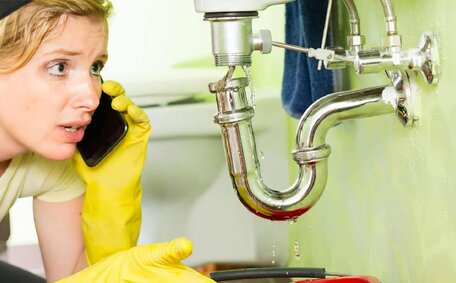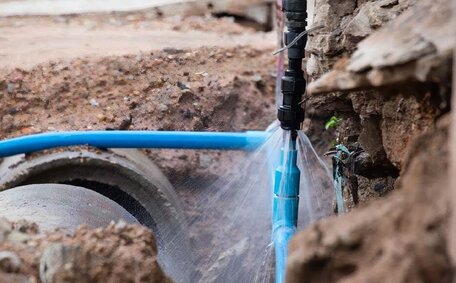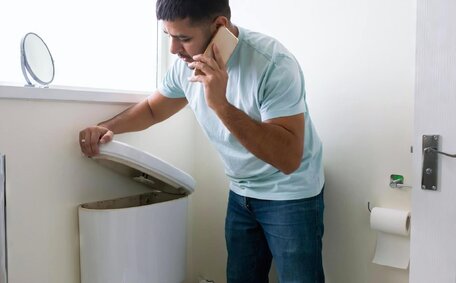Effective Drain Management for Restaurants and Cafes
Effective drain management is crucial for the smooth operation and customer satisfaction in restaurants and cafes. Accumulated grease, food scraps, and debris can lead to blocked drains, causing business disruptions and unsafe conditions.
We explore the strategy of oil and grease disposal management in food service venues and provide a guide for preventive care and when to seek professional plumbing services.
Commercial kitchens produce large amounts of fats, oils, and grease that can build up in drains. Restaurant managers should systematically instruct staff on proper disposal methods, schedule grease trap maintenance, and execute preventive drain care.
Routine cleaning of grease traps is essential for their proper maintenance.
Monthly cleanings are recommended for grease traps to ensure efficiency and compliance with local regulations.
Notwithstanding utmost diligence, high traffic eateries may unavoidably encounter a blocked drain hindering their operations due to liquid waste; a call today could offer preventive consultation. Our qualified technicians promise quick and effective solutions to plumbing issues, equipped with an extensive toolkit and expertise. With services like high-pressure water jetting and cctv drain inspections, we’ll get back to you as soon as possible, ensuring your system promptly operates at its peak, steering clear of recurrent drain problems.
This article examines common causes of blocked drains in commercial kitchens, preventative strategies for managers, ideal times for professional drain cleaning, and criteria for choosing a skilled plumbing company. Ensuring unobstructed drains is vital as your drains can be key to crafting quality encounters that entice patrons to return for more.
Causes of Blocked Drains in Food Service Settings
Effectively managing substances like cooking oil is critical to keep your commercial kitchen’s drains clear, as numerous eateries confront drain blockages due to the significant volumes generated within their operations. Staff mistakenly pouring fats and oils down the sink can worsen grease buildup.
Grease oils when cooled can cause blocked drains by adhering to the interior of pipes and solidifying, creating restrictive layers. Commercial drain-friendly grease traps are designed to mitigate the accumulation of grease oils before they become severe blockages, but must be diligently serviced and cleaned to function effectively.
ImImproper disposal of food scraps, such as flushing them down the drain, risks clogging your pipes.
Large remnants of discarded waste can efficiently cause obstructions in your plumbing drainage pipelines. Neglecting to filter out food waste like coffee grounds can get you unpleasant odours from decomposition inside your pipes. Managers should make sure the staff meticulously scrape plates and maintain clear sinks by disposing of potential blockage-causing food waste in bins.
Additional items like straws, cutlery, and strings from mops could inadvertently slip into drain openings, leading to clogging. Staff should take care to prevent such items from falling or being washed into drains to thwart any issues.
Drain screens installed into your kitchen can catch debris before it enters the pipes. It’s essential to fit floor drains with strainers too.
Restaurants and cafes can reduce plumbing blockages by maintaining grease traps, disposing of food scraps properly, and preventing foreign objects from entering the system. Ensuring a well-functioning plumbing system emulates the attention required at home to prevent clogs from unwanted debris in disposal units.
Signs of Drainage Issues
Vigilance regarding early warning signs and understanding what can accumulate in your drainage system is key for restaurants and cafes to avoid major disruptions. Several early indicators pertain directly to your sinks, and include:
- Slow draining sinks, especially after meals when dishwashing volume is high
- Gurgling noises coming from drains
- Unpleasant sewage odours around sinks or floor drains
- Water pooling around floor drains when a clog begins to back up your system
- Observations of blocked toilets with sluggish flushes or backing up
A blocked toilet or slow draining sink that resolves on its own could still herald underlying drainage complications, hinting at the need to remove accumulations like grease, food remains, and other matter. Allowing minor clogs to persist can lead to complete blockages. Managers should train staff to report any sluggish drains, odours, or drips around your sink so issues can be addressed and improve your establishment’s maintenance before escalating.
Catching problems early means our plumbers can tackle blockages quickly with drain snakes or enzymatic cleaners.
Consistent problems may require professional drain cleaning services.
Proactive steps save eateries time, money, and the trouble of dealing with plumbing complications during busy hours. Taking steps to keep your drains flowing freely prevents health code violations and expensive damages like flooding.
Preventative Maintenance
Dining establishments can take various preventative measures to protect against clogs; learn about our strategic approaches:
- You can carry out installation and maintenance of a robust plumbing system, ensuring everything that goes into it is crafted for high-volume commercial application and fittingly serves your property, with suitable pipe dimensions and grease traps positioned strategically.
- Perform nightly hot water flushes through all pipes and floor drains to dissolve accumulated grease.
- Ensure your grease trap is professionally cleaned or properly serviced every 2-4 weeks to prevent buildup. Some jurisdictions may require documentation of this maintenance.
- Regularly applying biological agents can help break down grease in traps and drains, preventing buildup.
- Regularly clean drain screens and strainers to capture food debris before it can clog pipes.
- Educate staff on best practises like scraping plates, collecting fats/oils and not pouring grease directly down drains.
- Use clearly labelled bins for food waste and used fryer oil to prevent it from entering drains.
- Check under sinks for any leaks indicating loose pipes or failing seals/gaskets.
- A CCTV survey can identify tree roots penetration or other issues in your sewer line.
If challenges persist, it may be time to consider calling for professional drain cleaning or repair services.
Drain Cleaning Methods
Learn about simple on-site tactics for eateries to address drain clogs before seeking our expert assistance:
- Regularly pour boiling water down the drain to dissolve grease and clear debris, taking care to prevent burns.
- Using a plunger - A forceful up-and-down motion can dislodge obstructions and is a practical first step. Cover overflow drain opening first.
- Using a drain snake/auger - Manual or powered snakes with hooked tips grab debris as they twist through pipes.
- Enzyme drain cleaners - Biologically active agents digest organic matter over several hours.
- Baking soda and vinegar - Chemical reaction helps break down buildup. Flush with hot water after.
Avoid harsh chemical drain openers that can damage commercial kitchen plumbing due to their corrosiveness. Only bio-enzymatic or natural acid products are recommended for in-house use.
When circumstances demand thorough drain cleaning or hydro-jetting, enlisting a specialised drain plumber with top-tier drain cleaning equipment is an astute choice. Before you tackle the problem with DIY methods which can aggravate clogs, consult an expert who provides the best solution using specialised tools to clear obstructions meticulously.
Maintaining grease traps and strainers is crucial for prevention. Simple, safe strategies can address issues without halting operations.
Conclusion
A free-flowing drain system is essential for restaurants and cafes to deliver quality service and sustain operations. As highlighted, with no call out fee to worry about, grease buildup, food debris and foreign objects easily cause obstructions if vigilant maintenance is not practised. Managers must be proactive with regular drain cleaning, enzyme treatments and thorough grease trap maintenance. Educating staff on proper disposal habits also prevents issues.
Proactive measures in restaurant plumbing can swiftly address blocked toilets, preventing minor clogs from escalating. For significant repairs, like those to a sewer line, a professional plumber has the specialised equipment required to address the issues quickly and safely.
Partnering with Sydney restaurants plumbing specialists like Northmead Plumbing means that eateries can expect prompt support without excessive call out fees for urgent drain challenges. We offer essential services like high-pressure hydro jetting, video inspections, drain replacements and grease trap repairs.
For more insights and to see our team in action as they meticulously identify faults and enhance your system’s functionality, please call us for proficient aid. Proper plumbing maintenance keeps customers satisfied and your business running smoothly.
To prevent blockage disruptions, engage our skilled professionals today for a comprehensive assessment of your restaurant’s plumbing needs.
For critical drainage services that maintain your establishment’s flow and cleanliness, connect with Northmead Plumbing, your local Sydney experts.






